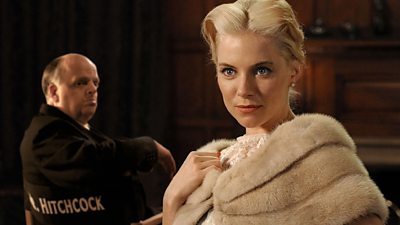The Girl
Alfred Hitchcock was at the height of his fame and creativity when, in 1962, he chose an unknown fashion model to star in his most ambitious film - The Birds.

Alfred Hitchcock was Britain’s greatest and most original screen talent, and I’ve always loved his films. As I watched them all over again, I felt I could see more and more clearly how much his own inner torment and unhappiness drives them."
But as he sculpted Tippi Hedren into the perfect Hitchcock blonde of his imagination, he became obsessed with the impossible dream of winning the real woman’s love.
His failure pitched them both into an emotional nightmare and damaged both of their careers. Screenwriter Gwyneth Hughes has interviewed Tippi Hedren, and surviving members of Hitchcock’s crew.
This film tells their full tragic story for the first time.
Alfred Hitchcock is played by Toby Jones, Tippi Hedren by Sienna Miller, Alma Hitchcock by Imelda Staunton and Peggy Robertson by Penelope Wilton.
RM
Gwyneth Hughes talks about the inspiration behind the film
I was dozing in a heap by a swimming pool on a summer holiday, when I got a phone call from producer Amanda Jenks. She only managed to get out the words “Alfred Hitchcock and Tippi Hedren” before I was already shouting “yes yes yes!” to this seductive, sinister, deeply touching story of love and obsession among Hollywood royalty.
The door was first opened for us by Tippi’s friend and biographer, Donald Spoto. His 2008 book Spellbound By Beauty is a close examination of the director’s well-known serial interest in an array of elegant, cool, blonde stars like Grace Kelly, Ingrid Bergman and Kim Novak. We call them “Hitchcock Blondes”, but Hitch himself only ever called them “The Girl” - and he was at the height of his fame and creativity when, in 1962, he chose a new girl to star in his most ambitious film, The Birds.
But as Alfred Hitchcock sculpted an unknown fashion model from Minnesota into the perfect blonde of his imagination, he became obsessed with the impossible dream of winning the real woman’s love.
When Tippi finally felt able to describe her ordeal to Donald Spoto, she ended almost half a century of silence.
Back then women were supposed to put up with unwanted male attention, or risk getting the blame for it. So Tippi felt powerless in the face of the great man’s desire, and had nobody she could talk to about it. She suffered in lonely silence, until she could stand it no more, and the dream of a film career ended in a bleak, ugly rupture with the man who discovered her.
How life has changed since then! When I went to interview Tippi myself at Shambala, the charitable foundation where she cares for abandoned or maltreated big cats, she told me with a wry smile that if the whole thing happened today, she could sue and become a rich woman!
But as I talked in more depth with her, and with surviving members of Hitch’s film crew, I began to see more and more clearly that this was much more than just an everyday story of a powerful boss and a casting couch.
There were two victims in this story. Two careers came off the rails. And two hearts were broken. Francois Truffaut, the celebrated French film director, interviewed Hitch at length during post-production on The Birds. In Truffaut’s opinion, Hitchcock never got over the collapse of his personal and professional relationship with Tippi Hedren.
Alfred Hitchcock was Britain’s greatest and most original screen talent, and I’ve always loved his films. As I watched them all over again, I felt I could see more and more clearly how much his own inner torment and unhappiness drives them.
There were unwanted sexual advances here, certainly, but there was also a terrible need and loneliness. I could not see Alfred Hitchcock simply as a villain.
Our film opens in 1961, as Hitch and his wife Alma spot a pretty young mother modelling in a television commercial. It takes their story through the filming of The Birds, restaging the terrifying scene where the birds attack The Girl in the attic - from the actress’s point of view. It ends in 1964 as Tippi completes her iconic role as the frigid thief Marnie, and walks out of her tormentor’s life forever.
Cast list and credits
Cast (in order of appearance)
Tippi Hedren - Sienna Miller
Alfred Hitchcock - Toby Jones
Alma Hitchcock - Imelda Staunton
Evan Hunter - Conrad Kemp
Peggy Robertson - Penelope Wilton
Melanie - Angelina Ingpen
Josephine Milton - Candice D’Arcy
Jim Brown - Carl Beukes
Rita Riggs - Kate Tilley
Maitre D - Aubrey Shelton
Ray Berwick - Leon Clingman
Bob Boyle - Patrick Lyster
Production Credits
Writer - Gwyneth Hughes (Five Days; The Mystery Of Edwin Drood)
Producer - Amanda Jenks (Mysterious Creatures; An Englishman In New York)
Director - Julian Jarrold (Appropriate Adult; Red Riding: In The Year Of Our Lord 1974)
Executive Producers - Lucy Richer (����ý) & Leanne Klein (Wall to Wall)